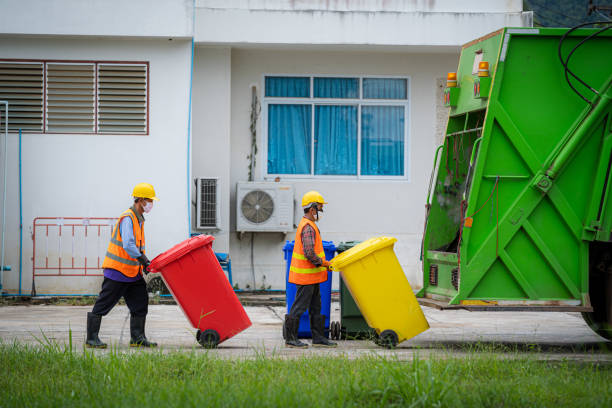How many jobs are available in public utilities? The public utilities sector plays a vital role in society, providing essential services such as electricity, water, gas, telecommunications, and transportation.
These services are critical for the functioning of modern communities and are fundamental to the daily lives of individuals and businesses alike.
As the demand for reliable and efficient public utilities continues to grow, so does the need for a skilled workforce to support and maintain these systems.
If you’re curious about the job prospects in the public utilities industry, you may be wondering, “How many jobs are available in public utilities?”
This question reflects a common desire to understand the employment opportunities within this sector and the potential for career growth.
In this article, we will explore the job market in public utilities, examining the number of jobs available in this industry as well as other crucial things you need to know.
By gaining insights into the job landscape of public utilities, you can better navigate your career choices, understand the demand for specific roles, and make informed decisions about education, training, and job searching.
Whether you’re a recent graduate considering your career options, an experienced professional looking to transition into a new field, or someone interested in making a difference in the community through public utilities, this article aims to provide you with valuable information about the job opportunities in this dynamic sector.
Also Read:
What Do Consumer Non-Durables Jobs Pay?
How Many Jobs Are Available in Consumer Services?
How Many Jobs Are Available in Public Utilities?
The public utilities sector offers a wide array of employment opportunities, catering to the growing demand for essential services such as electricity, water, gas, telecommunications, and transportation.
The exact number of jobs available in public utilities can vary depending on factors such as geographical location, population size, and economic conditions.
However, overall, the sector presents a significant number of job openings across various roles and skill levels.
From engineers and technicians responsible for infrastructure maintenance to customer service representatives and administrative staff, public utilities require a diverse workforce to ensure efficient and reliable service delivery.
Moreover, with advancements in technology and the increasing focus on sustainability, the sector is witnessing new job opportunities in renewable energy, smart grid systems, and environmental management.
As societies continue to rely on public utilities, the industry remains a promising source of employment for individuals seeking stable and impactful careers.
Job Trends and Growth in the Public Utilities Sector
The public utilities sector is experiencing notable job trends and substantial growth in recent years.
As societies become increasingly reliant on essential services such as electricity, water, telecommunications, and transportation, the demand for skilled professionals in this sector continues to rise.
One significant trend is the emphasis on renewable energy and sustainable practices, leading to the creation of new jobs in areas such as solar and wind power, energy efficiency, and green technologies.
Additionally, the integration of advanced technologies like smart grids, digital infrastructure, and IoT systems is driving the need for professionals with expertise in data analytics, cybersecurity, and automation.
The aging workforce in the public utilities industry also presents opportunities for job seekers, as retirements create openings for new talent.
Overall, the public utilities sector offers promising prospects for career growth and innovation, making it an attractive industry for individuals seeking long-term employment and meaningful contributions to society.
Key Skills and Qualifications for Jobs in Public Utilities
Jobs in the public utilities sector require a specific set of skills and qualifications to ensure efficient and reliable service delivery.
Technical expertise is crucial, particularly in roles such as engineers, technicians, and operators, who need a solid understanding of the specific utility they work with, whether it’s electricity, water, gas, or telecommunications.
Proficiency in areas like infrastructure maintenance, troubleshooting, and equipment operation is essential.
In addition to technical skills, strong communication and customer service abilities are vital for roles that interact directly with the public, such as customer service representatives and field technicians.
Problem-solving, critical thinking, and adaptability are valued traits in an industry that faces evolving challenges and technological advancements.
Depending on the specialization, certifications, licenses, and relevant education (such as engineering degrees or trade school training) may be required.
Furthermore, a commitment to safety protocols and environmental sustainability is increasingly valued in public utilities jobs.
Overall, a combination of technical expertise, interpersonal skills, and a commitment to service excellence is key to thriving in the public utilities sector.
Challenges and Opportunities in the Public Utilities Job Market
The public utilities job market presents both challenges and opportunities for job seekers and professionals in the industry.
One significant challenge is the aging workforce, as many experienced employees are nearing retirement age, creating a need to fill their positions with qualified individuals.
This generational shift opens up opportunities for younger professionals to enter the field and advance their careers.
However, the industry is also evolving rapidly, with advancements in technology, regulatory changes, and increasing focus on sustainability.
Staying updated with these developments and acquiring the necessary skills can be a challenge for both job seekers and existing employees.
Additionally, the public utilities sector faces challenges such as funding constraints, infrastructure maintenance, and adapting to changing customer expectations.
On the positive side, these challenges present opportunities for innovation, such as the integration of renewable energy sources, implementing smart grid systems, and embracing digital transformation.
Job seekers who possess the right skills, such as knowledge of emerging technologies, expertise in sustainability practices, and the ability to adapt to a changing landscape, can capitalize on these opportunities and contribute to the growth and development of the public utilities sector.
Also Read:
How Many Jobs Are Available in Finance?
What SAT score is needed for scholarships?
Conclusion
The public utilities sector offers a significant number of job opportunities across various roles and skill levels.
With the growing demand for essential services and the need for a skilled workforce to support and maintain infrastructure, the job market in public utilities remains robust.
Factors such as geographical location, population size, and economic conditions influence the exact number of available jobs.
However, the sector continues to evolve, embracing renewable energy, technological advancements, and sustainability practices, creating new avenues for employment.
By understanding the job trends, key skills, and qualifications required, individuals can navigate their career paths and contribute to the vital services provided by public utilities.
The sector presents promising prospects for those seeking stable and impactful careers in supporting and enhancing communities’ essential needs.















[…] How Many Jobs Are Available in Public Utilities? […]